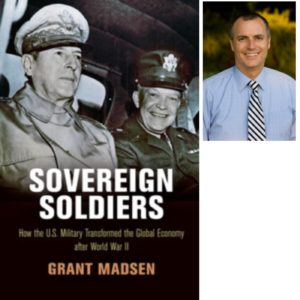Podcast: Play in new window | Download
Subscribe: RSS

How German Nazis made alliances with Americans before WWII with Bradley Hart
Check out the book here https://amzn.to/3eOf1S3
Interview Timeline
Bradley Hart is an assistant professor at Cal State, Fresno and his research focus is far right extremism in the United States. We discussed his latest book on American support for Nazis prior to WWII. Hitler’s American Friends (Thomas Dunne Books, 2018)
0:47 – Bradley talks about how he got into studying and writing WWII history. Eugenics started in Britain and the US especially in California.
2:27 – Bradley talks about his book and the research. His book focuses on various groups that supported the German Nazi party.
5:30 – Bradley talks about the various open and secret ways in which Germany tried to influence US politics.
7:07 – Bradley talks about anti-Nazi Germans in the US. However a lot of US college administrators supported Nazi discussions on campus to communist support.
11:40 – Bradley talks about religious figures that supported the Nazis.
14:24 – Bradley talks about Nazi-ism and occultism especially among the SS.
15:58 – Bradley talks about US military support for the Nazis.
16:55 – Bradley talks about politics affects on US support for the Nazis.
17:50 – Bradley talks about how he did his research and the diaries he came across. British agents spied on Nazis in the US and helped stop them.
24:34 – Bradley mentions which American cities had the most Nazi support.
27:15 – Bradley mentions Hollywood films and Germany. He also talks about how the British viewed the US and support for Nazis.
31:15 – Bradley was surprised at the bipartisan hatred for FDR that he found. He also talks about American and British authors who supported and opposed Nazi thought.
36:06 – Bradley talked about using FOIA to get some documents.
41:45 – Bradley mentions a Hollywood ant-Nazi league that included Hollywood celebrities and movie people. But this league was also backed by the communists.
51:38 – He’s on twitter @drbhart and he has a website at bradleywhart.com.
Links of interest
http://bradleywhart.com/about-me/
For more “Military History Inside Out” please follow me on Facebook at warscholar, on twitter at Warscholar, on youtube at warscholar1945 and on Instagram @crisalvarezswarscholar
Guests: Bradley Hart
Host: Cris Alvarez
Tags: military, history, military history, conflict, war, interview, non-fiction book, WWII, World War Two, Hitler, Germany, Nazi, FDR, United States
Check out the book here https://amzn.to/3eOf1S3


 Charles Glass is a broadcaster, journalist and writer. Early in his career he worked in the ABC News Beirut bureau with Peter Jennings. He covered the October Arab-Israeli War on the Egyptian and Syrian fronts and the civil war in Lebanon. He was ABC News Chief Middle East correspondent from 1983 to 1993. He’s been a freelance writer since then covering hot spots around the world. He spoke to me about his latest book on two British spies who operated in WWII France.
Charles Glass is a broadcaster, journalist and writer. Early in his career he worked in the ABC News Beirut bureau with Peter Jennings. He covered the October Arab-Israeli War on the Egyptian and Syrian fronts and the civil war in Lebanon. He was ABC News Chief Middle East correspondent from 1983 to 1993. He’s been a freelance writer since then covering hot spots around the world. He spoke to me about his latest book on two British spies who operated in WWII France. Dr. Grant Madsen has long been interested in history and this led him to earn a PhD in History. Sovereign Soldiers is his first book and explains how the US military transformed the global economy with the economic policies it applied to the occupation of Germany and Japan after WWII.
Dr. Grant Madsen has long been interested in history and this led him to earn a PhD in History. Sovereign Soldiers is his first book and explains how the US military transformed the global economy with the economic policies it applied to the occupation of Germany and Japan after WWII.